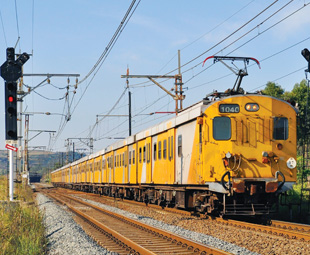Of coalitions and cartels

Here’s wising our new “hybrid” metro councils luck, as they try to make up lost ground and follow through on their election promises … and some advice for the EFF…
The EFF is the new gun in town, riding a horse called “equality”. As such, it should insist that the massive distortions between rail and taxi subsidies be addressed, and that the poor should benefit from consistent fares irrespective of the mode of travel. Both the moribund ANC and the pretentious DA have failed to give proper leadership on these issues.
One of the first things the new metros can do to prove that they are serious about service delivery is to scrap any plans for October Transport Month (OTM). This tiresome charade has, for decades, wasted resources on silly activities that have merely boosted the catering, conference, printing and t-shirt industries…
Even if OTM is a provincial or central government initiative, it provides an early opportunity for every metro in South Africa to confront the higher levels of government (something that they will have to do anyway on various other issues) and simply refuse to participate in any of the arrangements. The money saved could be used to tidy up the mediocre rail and bus websites (with unreadable timetables and no maps) in metros throughout South Africa.
As usual, public transport didn’t feature much in the recent municipal elections. Most of the focus was on job creation, service delivery, inequality and corruption. The closest issue relating to transport was e-tolls, which cost the ANC a lot of votes in Gauteng.
This won’t be the end of the matter, however – it will resurface. The toll road industry has always relied on the argument that the fuel levy does not provide sufficient funds to pay for new roads, and that other sources of funding are required.
A paper delivered at the 2016 Southern African Transport Conference reinforced this view, claiming that improvements in fuel efficiency and the growing use of hybrid vehicles would hold back fuel consumption (and tax revenue) in future. Be assured – this argument will be back in a court near you before very long.
Job creation is another issue with strong implications for public transport. It’s amazing how economists, analysts, non-government organisations and think tanks rattle off the numbers of new jobs required, without saying much about how the newly employed are going to get to work.
At the high end, the National Development Plan talks of 11 million new jobs. Even if we bring that figure down to one million, and assume that half of them can walk to work, that still leaves a requirement for an extra 30 000 minibus taxis countrywide. Buses and trains won’t cope.
Even if we can squeeze more taxis on to our congested roads, few of the “new” workers will have much left over to spend once they have paid the unsubsidised taxi fare. That won’t help economic growth or equality in South Africa. I hope that the panel recently appointed to come up with a minimum wage takes this into account.
During July, a deputy GM at the International Monetary Fund (IMF), David Lipton, visited South Africa. He gave a speech that was widely acclaimed by the media. Sadly, only 54 words were devoted to public transport, and they aren’t very helpful:
“Or look at the transport industry, which provides a service that most South Africans rely on. In other countries, transportation is fiercely competitive and can provide poor people with a leg up in the job market. However, taxi and bus cartels in South Africa are highly organised and deter new entrants, including with the use of violence.”
First, transport’s main purpose is not to create jobs, but to enable other sectors to function properly. (Let’s “create” 20 000 jobs overnight by requiring every bus to have a conductor!)
Second, every big city in the United States has a public transport system operated on cartel principles. The IMFs headquarters on 19th Street in Washington D.C. are served by bus route 80, operated by the local cartel, called MARTA. I would like to see how far a new entrant would get if it tried to take on MARTA!
I would have preferred to read the following 53 words, which I hope the EFF will consider adding to its policy documents:
“Public transport in South Africa is of such a low standard that many people are being forced to use expensive private cars for their journey to work. Many others, who cannot afford cars, are being forced to pay expensive, unsubsidised private minibus-taxi fares. This not only undermines the economy, it also perpetuates inequality.”
By forcing the lame ANC and smug DA to get on board, the EFF could make a major contribution towards fixing public transport in South Africa.
Vaughan Mostert lectured on public transport issues at the University of Johannesburg for nearly thirty years. Through Hopping Off, Mostert leaves readers with some parting food for thought as he continues his push for change in the local public transport industry.
Published by
Focus on Transport
focusmagsa




